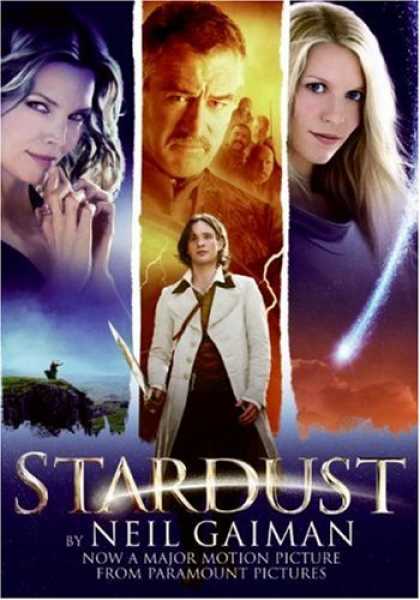This is an enchanting story that lives up to the promise of a “once upon a time beginning,” filled with romance, adventure, magic, and wit. It has witch sisters who need to find a fallen star to make the potion that gives them eternal youth, prince brothers who want to find it because the jewel that knocked it out of the sky will determine which of them will be king, cloud pirates who sail in a flying ship, and a unicorn.
 Tristan (Charlie Cox) promises to bring back a fallen star to win the hand of the girl he loves. To find it, he must cross the wall that divides his village from the magical land of Stormhold on the other side. It turns out that he has a connection to Stormhold that he did not know. And it turns out that the fallen star is not an it but a she — the star has a human form, a woman named Yvaine (Claire Danes). And so begins a journey that will include sword fights and transformations, captures and escapes, bickering and kisses, encounters with rascals, villains, and imprisoned princesses, and reunions with unexpected lost connections.
Tristan (Charlie Cox) promises to bring back a fallen star to win the hand of the girl he loves. To find it, he must cross the wall that divides his village from the magical land of Stormhold on the other side. It turns out that he has a connection to Stormhold that he did not know. And it turns out that the fallen star is not an it but a she — the star has a human form, a woman named Yvaine (Claire Danes). And so begins a journey that will include sword fights and transformations, captures and escapes, bickering and kisses, encounters with rascals, villains, and imprisoned princesses, and reunions with unexpected lost connections.
Director Matthew Vaughn (“Layer Cake”) blends romance, action, and comedy with brilliantly imagined visual effects, seasoning fairy tale enchantment with a splash of modern sensibility. Peter O’Toole as the dying king, Robert DeNiro as the pirate captain with a surprising hobby, and Ricky Gervais as a dealer in stolen goods, and Rupert Everett as one of a Greek chorus of murdered princes are high-spirited but never wink at the audience; the film is as sincere as its appealing lead characters. Pfeiffer has a blast as the witch, whether cooing at her restored beauty or blasting through its disintegration as she pursues the star.
Modern without being post-modern, ironic without air-quotes, romantic without apology, this is a fairy tale for our time because it takes us beyond time and reminds us that happily ever after is still a dream worth having.
Parents should know that this film includes fantasy violence, with characters injured and killed in a variety of ways, everything from having their throats cut to being thrown out of windows, poisoned, and drowned. There is some mild language and there are some mild sexual references and non-explicit sexual situations. A strength of the movie is unexpected acceptance of and support for a cross-dressing character.
Families who see this movie should talk about what drew Dunstan and Tristan to the other side of the wall. What is the difference between being a shop boy and a boy who works in a shop?
Families who enjoy this movie will also enjoy sumptuous fantasy classics The Princess Bride , Labyrinth
, Labyrinth , Time Bandits
, Time Bandits , and Ladyhawke
, and Ladyhawke (also featuring Pfeiffer). And they will enjoy the graphic novel
(also featuring Pfeiffer). And they will enjoy the graphic novel by Neil Gaiman, illustrated by Charles Vess.
by Neil Gaiman, illustrated by Charles Vess.

 Tristan (Charlie Cox) promises to bring back a fallen star to win the hand of the girl he loves. To find it, he must cross the wall that divides his village from the magical land of Stormhold on the other side. It turns out that he has a connection to Stormhold that he did not know. And it turns out that the fallen star is not an it but a she — the star has a human form, a woman named Yvaine (Claire Danes). And so begins a journey that will include sword fights and transformations, captures and escapes, bickering and kisses, encounters with rascals, villains, and imprisoned princesses, and reunions with unexpected lost connections.
Tristan (Charlie Cox) promises to bring back a fallen star to win the hand of the girl he loves. To find it, he must cross the wall that divides his village from the magical land of Stormhold on the other side. It turns out that he has a connection to Stormhold that he did not know. And it turns out that the fallen star is not an it but a she — the star has a human form, a woman named Yvaine (Claire Danes). And so begins a journey that will include sword fights and transformations, captures and escapes, bickering and kisses, encounters with rascals, villains, and imprisoned princesses, and reunions with unexpected lost connections.